1860-1879: southern corner St John St & the Quadrant Google Maps
1880+: SE corner St John & York Streets. Google Maps.
Later Metropolitan Hotel.
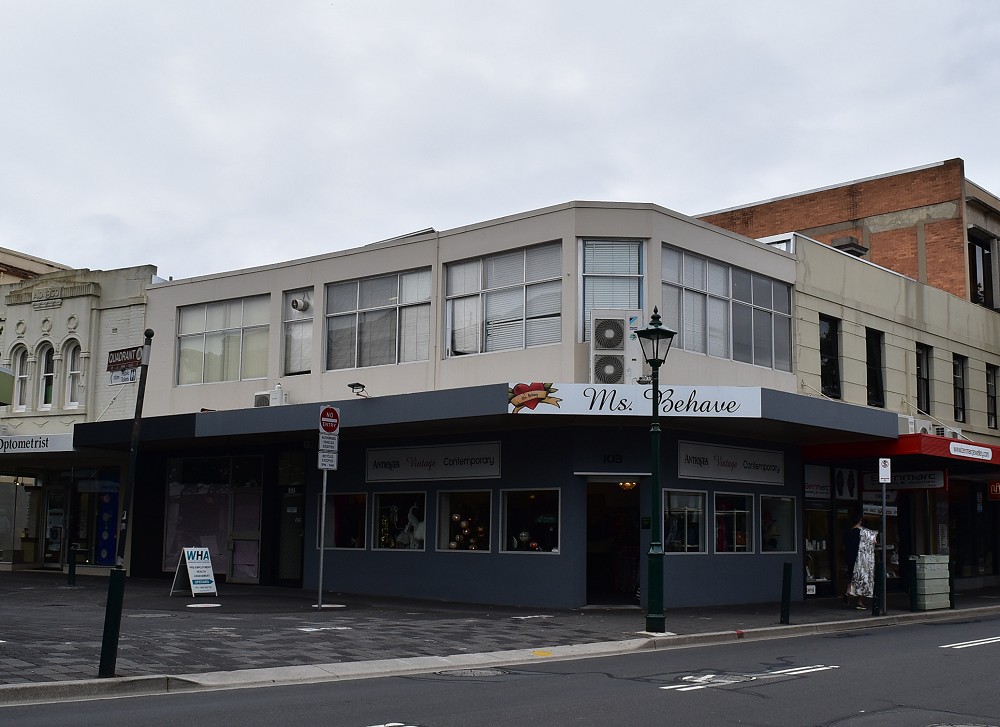
Location, cnr Quadrant and St John Street.
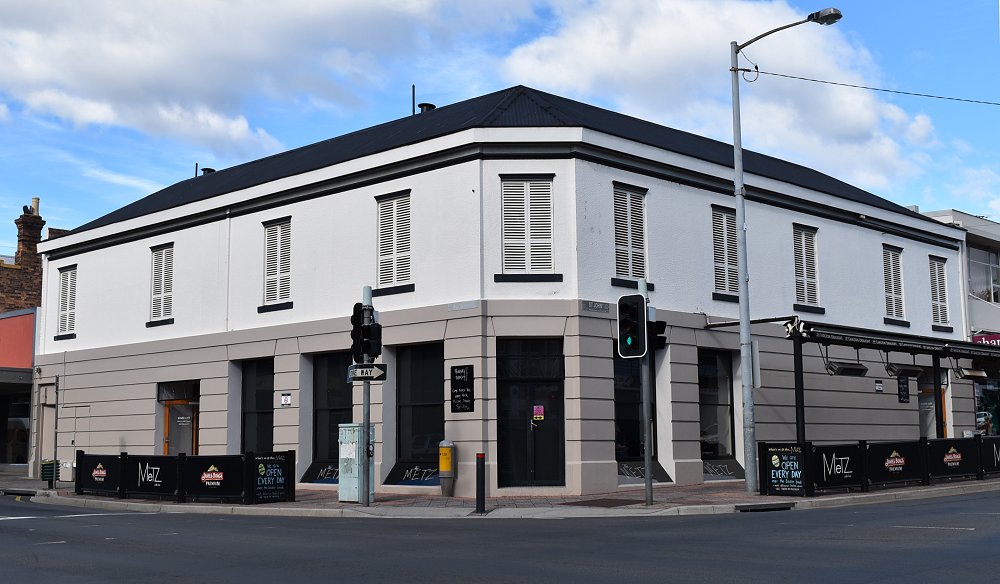
Cnr St John and York Streets.
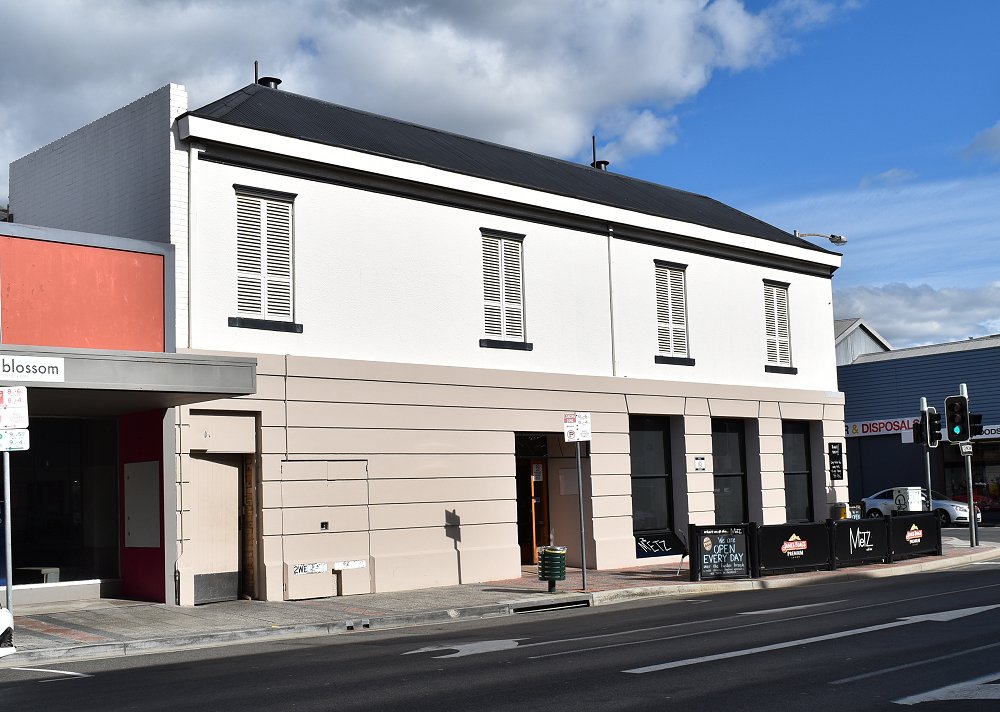
Cnr St John and York Streets.
Photo, 1940s, as the Metropolitan.
1860-1862 Benjamin Hyrons, Three Grand Masters, Quadrant. G
1863 Thomas Bruff, Shakespeare Hotel, Quadrant name changed
1864-55 Benjamin Hyrons, Shakespeare Hotel, Quadrant
1866 Matthew Wilkes, Shakespeare
1866-67 Mr J. Solomon, Shakespeare Hotel, St John-street
1868-73 Joseph Dyson, sen Shakespeare Hotel, Quadrant
1874-78 Joseph Dyson, Shakespeare Hotel, St. John street and Quadrant
1880-88 Joseph Dyson, sen., Shakespeare Hotel, St. John and York streets location changed
1889-92 William Job Spearman, , York and St. John streets, Shakespeare Hotel
1893-1902 Hugh George Webb, Shakespeare Hotel, York and St John street
1903 Hugh Huston, Shakespeare Hotel, St John-street
1904 Edwin Waller, Metropolitan Hotel name changed
The sub-division of the block formerly Mr. White’s property took place when the present Quadrant was laid out by Mr.Henry Clayton, and the land cut up into building allotments and sold. Mr. B.Hyrons bought one corner of the St. John street end of the Quadrant, and built the old Shakespeare Hotel there, having also a small brewery for a time. The opposite corner was bought by Mr. Price, a baker, who built the existing shop and dwelling house, and the old Theatre Royal was built next to it, where the Oddfellows’ Hall now stands, by a company, and subsequently passed into the possession of the Bank of Tasmania, while the City Hotel, adjoining, was built by the late Mr. Jas. Lilly, of the Salmon and Ball Hotel.
Examiner, 14 July 1885
Then Mr W. BL Clayton, architect, interested in the property, prepared a plan, laying out the Quadrant, and dividing the land connected with the [Launceston] hotel into building allotments. These were bought up eagerly at the sale at from £16 to £24 per foot frontage. It was considered then that the Quadrant would be a much-frequented thorough fare, and as Mr James Lilly and Mr Ben. Hyrons (both speculative men) were bidders for frontages in St. John-street, the bidding was very brisk. The most valuable sections of the whole property — those at the junction of Brisbane and St. John streets— were purchased by Mr William Hart, at from £33 to £24 per foot. Some 15 years afterwards these sections were repurchased by Mr Frank Hart, who built upon them the most ornamental block of buildings in Launceston. The adjoining sections up to the block where the Mutual Insurance Company’s office now stands were purchased at from £20 to £21 per foot — one by Mr Lilly for the erection of a hotel, the rest for the Theatre Royal, now spoiled at great cost, and known as the Oddfellows’ Hall. The next section was bought by Mr Price, a baker, and the opposite corner by Mr Ben. Hyrons, who built a hotel, which he named the ‘Three Grand Masters’— a Masonic sign — but the hotel never became a very popular institution under that title.
Daily Telegraph, 18 February 1885
—————————————
From “Launceston Annual Licensing Meeting”:
The applications of Mr. Roderick Carey for a licence to his new premises at the corner of Balfour and Bathurst-streets, of Mr. Alfred Fowler for those at the corner of Brisbane and Margaret streets. and of Mr. Benjamin Hyrons, for those at the corner of St. John-street and the Quadrant, were refused on the ground of there being no necessity for additional Public houses in those neighbourhoods.
Cornwall Chronicle, 4 December 1858
Hotel Accommodation near the Theatre. — Great inconvenience is experienced by respectable persons visiting the Theatre Royal, in consequence of the very limited Hotel accommodation in its vicinity. The hotels in Brisbane-street, are generally so crowded, that it is unpleasant to the feelings of most persons to go into them, while at the corner of the Quadrant, and St. John-street, stands a most commodious new house, built for an hotel by Mr. B. Hymns, who applied for a license for it at the annual licensing meeting but was refused, because the premises were not then quite complete. In all St. John-street there is not a single public house, except the London Hotel, and Market House Tavern, which are situated more in Cameron and William-streets than in St. John-street, Mr. Hyrons has sunk a large sum in the erection of the building referred to, which he intends to open as the “Shakespeare Hotel,” as such it would be a public convenience, and we can see no reason why his application for a licence should be refused. Cornwall Chronicle, 14 April 1858
BREACHES OF THE LICENSING ACT –
O’Connor v. Hyrons.-This was an information against Mr. Benjamin Hyrons, for not having his licensed house the “Three Grand Masters,” cleared at the proper time. The Bench fined the defendant 20s. and costs.
Launceston Examiner, 7 June 1860
Breach of Master and Servant Act.
Thomas Ryan was fined £5 and 8s 6d costs for having been drunk, disorderly, and riotous on his Master’s premises on the 10th inst. It appeared from the evidence that the defendant had been in the service of Mr Benj. Hyrons, who went with Mrs Hyrons to Longford on the 10th instant, leaving a young woman in charge of the “The Three Grand Master’s” Inn, and the defendant on the premises. The latter got drunk and went into the bar demanding more drink which he offered to pay for. The barmaid refused try give him drink on any terms. He then seized her by a band she wore upon her neck, threw her down and kicked her. Mr William Bryant happened to he present, and he interfered to protect the young woman Ryan then turned upon Mr. Bryant and committed a savage assault upon her. His only defence was that he was drunk, and did not know what he had done.
Cornwall Chronicle, 18 May 1861
Assault.-Thomas Hughes was charged with assaulting Benjamin Hyrons.
From the evidence of complainant and Mr. Thomas Bruff it seemed that defendant went into complainant’s licensed house, the “Three Grand Masters,” on the night of the 11th instant, and took his seat in the bar parlour with complainant and Mr. Bruff. Defendant was not sober at the time. After sitting there for a time, defendant said to complainant, “Where’s my hall-and-half? ” Complainant replied that defendant had not called for any, and advised him to go home, as his wife had been looking after him. Defendant then made a disgusting and insulting observation to complainant, whereupon the latter threatened to knock him down if he repeated the insult. Defendant caught hold of complainant by the stock, upon which Bruff interfered, and a struggle, during which defendant bit him on one arm, he put defendant out of the house. Complainant’s stock was broken whilst Bruff was releasing him from defendant’s grasp. In his defence Hughes merely said that he remembered being in complainant’s house in the early part of the afternoon of the day in question, but had no recollection of being there at night, nor of what took place, or how he got home. The Bench considered the charge fully proved, and inflicted a penalty of £3 and costs, 11s. 6d., or in default of payment one month’s imprisonment with hard labor. The fine was immediately paid.
Launceston Examiner, 21 May 1863
Breach of Licensing Act.-Benjamin Hyrons pleaded guilty to having committed a breach of the Sunday trading clause of the Licensed Victuallers Act in not keeping his licensed house, the “Three Grand Masters,” closed on Sunday the 10th instant.–He was fined 5s. and costs, 7s. 6d.
Launceston Examiner, 21 May 1863
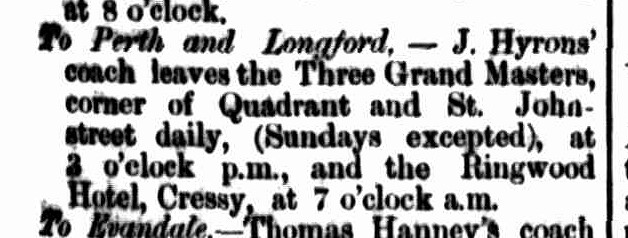
Cornwall Chronicle, 8 August 1863
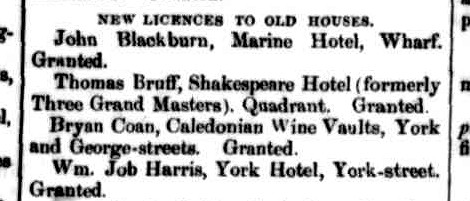
Launceston Examiner, 3 December 1863

Cornwall Chronicle, 3 August 1864
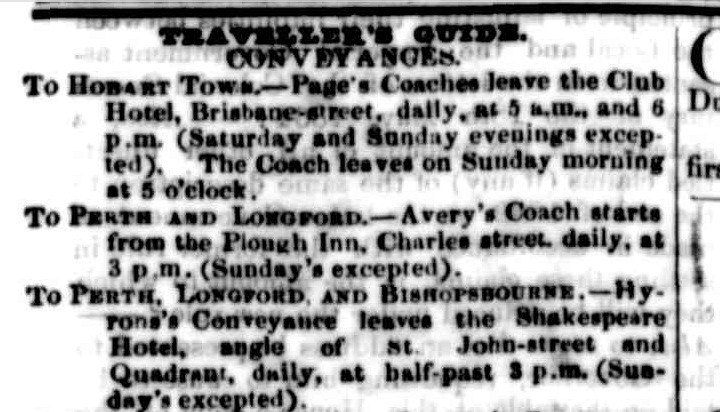
Launceston Examiner, 9 August 1864
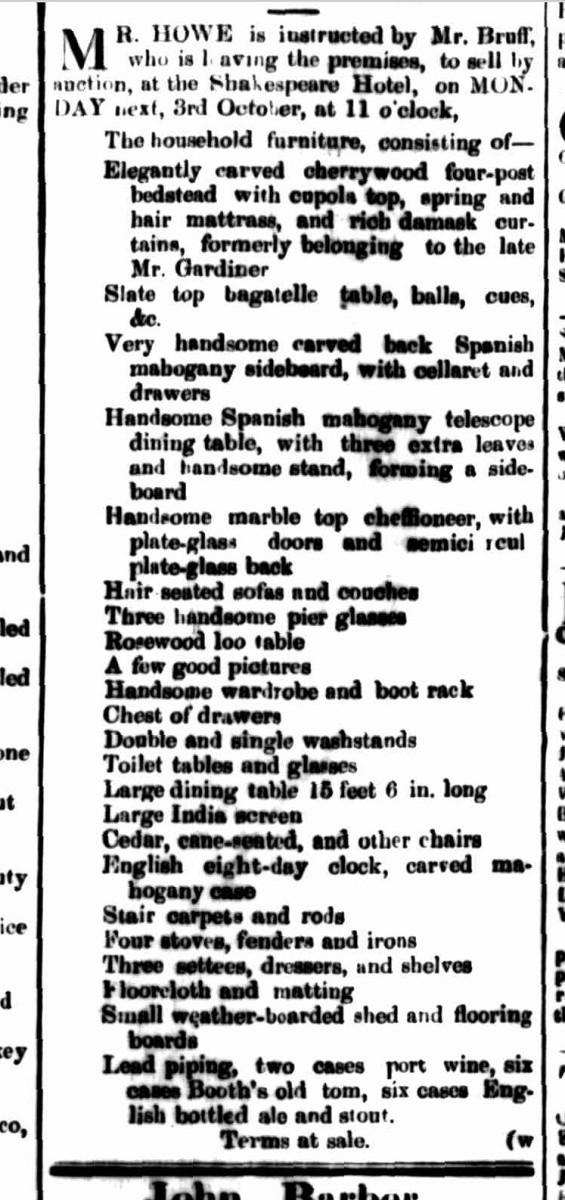
Launceston Examiner, 27 September 1864
Mr. Benjamin Hyrons made application at the Police Office, before the Police Magistrate and Captain. Reid, yesterday, for permission, under the amended licensing act, No. 2, to continue to sell liquor under the license held by Mr. Thomas Bruff, at the ‘ Shakespeare Hotel. The bench Granted the application.
Cornwall Chronicle, 8 October 1864
COURT OF REQUESTS.-The £30 Court sat on Tuesday, before the Commissioner J. Whitefoord, Esq., some ten cases being disposed of. Mr. W. Belford obtained a verdict for £18 6s 3d against John Belford, for rent. In a suit by Thomas Bruff verses Benjamin Hyrons, to recover £22 6s for rent of stables, &c, a set-off for the greater part of the amount was shown, and a verdict for £1 6s. only was returned. A counter action by Mr. Hyrons against Mr. Bruff for damages sustained in consequence of the latter not quitting the Shakespeare Hotel according to agreement, prior to the Quarterly Licensing Meeting on the 1st of August last, resulted in a verdict for plaintiff for £20.
Launceston Examiner, 8 December 1864
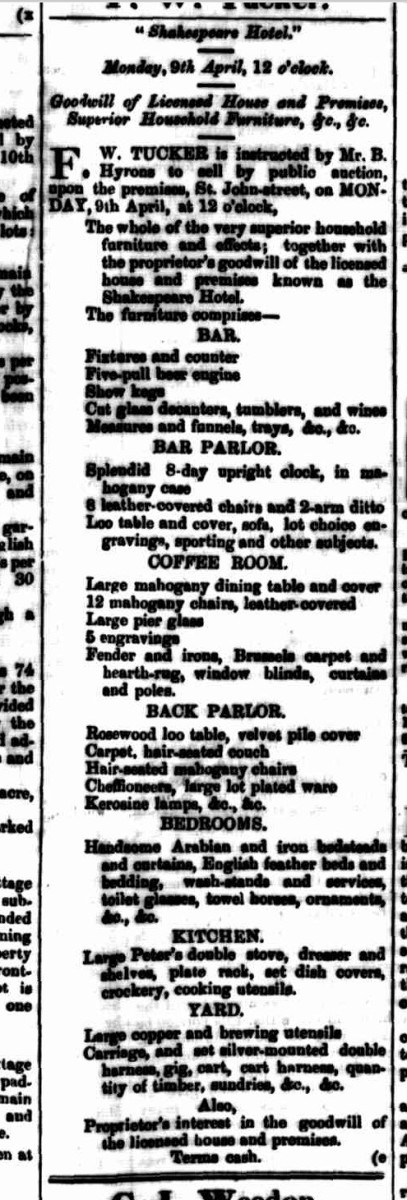
Launceston Examiner, 27 March 1866
Yesterday, at the Police-office before the Police Magistrate and Charles McArthur, Esq-Mr Matthew Wilkes, late of the White Swan Inn, Hobart Town, applied for permission to sell until August next under the license to Mr Benjamin Hyrons, in the Shakespeare Hotel, St John-street and Quadrant. The application was acceded to.
Cornwall Chronicle, 5 May 1866
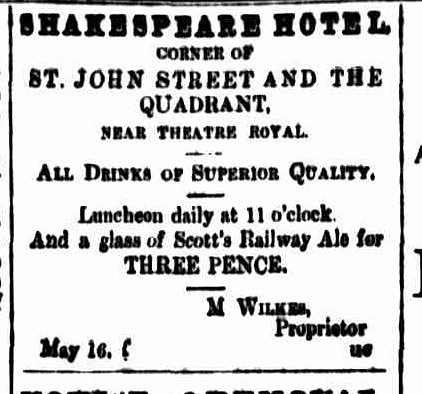
Cornwall Chronicle, 16 May 1866
From “Annual Licensing Meeting”:
The Shakespeare Hotel, St. John street, from Benjamin Hyrons to Matthew Wilks. In reply to a question from the Chairman, the Superintendent of Police stated that the applicant Wilks had already, while selling under a provisional license, been summoned at the Police Office for keeping his house open after hours, and refusing to close it at the direction of the police. . The Chairman said if anything of the sort occurred again, Mr. Wilks would be deprived of his license at the annual meeting. The meeting rose at 11.20.
Launceston Examiner, 7 August 1866
TOWN TALK AND TABLE CHAT.
On Saturday last, before the Police Magistrate and George Dean, Esq., J. P., Mr Moses Julian Solomon applied for permission to sell liquors in the ‘Shakespeare Hotel,’ St John street, under the licence held by Mr M. Wilks; and Mr Joseph Brown applied for permission to sell liquor in the ‘Sir William Wallace Inn,’ Franklin Village, under the license held by Mr John Pearce, Both applications were granted.
Cornwall Chronicle, 3 October 1866

Launceston Examiner, 14 March 1868
Breach of the Licensing Act. — Joseph Dyson, jun., of the Shakespeare Hotel was charged by the Superintendent of Police with permitting prostitutes to remain in his licensed house. Defendant pleaded guilty. The Superintendent of Police stated that a constable heard a row in defendant’s house about 1 o’clock on the morning of the 14th ult., and one prostitute was forcibly ejected shortly afterwards two others came out, whom the constable had previously met on his beat and advised to go home. Mr Mason said he had reason to believe that defendant was only the nominal holder of the license and that his father was in reality the manager of the place. If this could be proved he (Mr Mason) would certainly oppose the license on the next licensing day. They would fine defendant £10 with costs 7s 6d.
Cornwall Chronicle, 8 September 1873
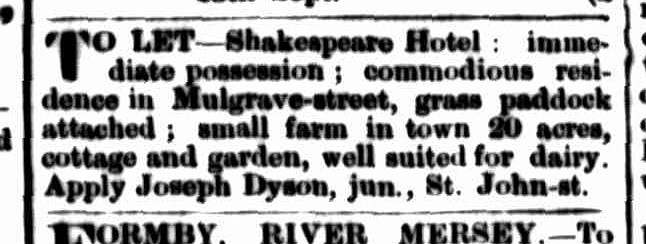
Launceston Examiner, 27 September 1873
From “Annual Licensing Meeting, Launceston”:
NEW APPLICATIONS FOR OLD LICENSED HOUSES.
Joseph Dyson, sen., Shakespeare Hotel, Quadrant.
Mr Mason said he could supply some information with regard to this application. The present occupant of the house was Joseph Dyson, jun., he having obtained the license when his father was sentenced to twelve months’ imprisonment for an indecent assault on a girl about two years ago. During the present year the son had been fined £10 for allowing prostitutes to be in his house, and it was a question whether the father, a man who had been deprived of his license two years ago for an indecent assault, was a fit person to be allowed to hold the license.
Dr. Miller said that there were extenuating circumstances to be urged. That sentence had not been agreed with by everyone, and a numerously signed petition had been forwarded lo the Government, in consequence of which half Dyson’s sentence bad been remitted. Nothing else had ever been brought against him, and the offence committed at the house during the present year was while it was under the son’s management.
The Superintendent of Police said that the management of the house had been good since Dyson, jun., was fined. It was closed regularly, and the bad characters complained of were no longer allowed there. H could not prove that the son hardly ever resided there, but he believed he did not, and that it was the father who managed the place.
Mr Collins appeared in support of the application, and said that Mr Dyson had been thirty-four years in the colony, ten of which he had been a licensed victualler. If he had broken the law, he had been punished for it, and to remove the license from him, would be prevent him from retrieving his character and position, and a conviction against the son should not prevent the father being given a further chance. On a vote being taken, three magistrates voted for the granting of the license, and one against it, the remainder remaining neutral.
Cornwall Chronicle, 3 December 1873
A DISORDERLY FEMALE.— Mary Collier, a well known character, was charged with
having created a disturbance in the streets on the previous evening. It appeared she had been hammering away at the Shakespeare Hotel window, and threatening to break it open if she did not get in. She was accordingly locked up.
The defendant pleaded guilty, and was fined £1, or in default seven days’ imprisonment in the House of Correction.
Cornwall Chronicle, 4 May 1874
At the corner of York and St. John streets the Messrs Gunn are rapidly progressing,
with the building of an hotel for Mr Joseph Dyson. Mr Dyson’s lease of the Shakespeare Hotel, corner of St. John-street and the Quadrant, expires shortly, and he intends opening the new premises alluded to under the old name. The building is to be ready for occupation by the 1st October next. It is of brick, with four rooms on the ground and six on the first floor, exclusive of kitchen, store, and outbuildings.
Launceston Examiner, 1 September 1879

Launceston Examiner, 2 December 1880
ARREST OF A THIEF–At three o’clock yesterday morning Constable M’Queen noticed a man emerging from a side entrance to the Shakespeare Hotel, at the corner of St. Johns and York streets, carrying a bundle. M’Queen accosted him, and discovered that the parcel contained two bottles, one of which was full of brandy. The man could not give a satisfactory account as to how they came into his possession, so the constable called up the landlord, and requested him to make search in order to ascertain if any bottles were missing from the hotel. This was done, and the landlord noticed that there were several gaps in the rows of bottles on the bar-room shelves. He identified the property found upon the man as his, and M’Queen therefore marched his prisoner to the police station. He gave his name as William Curtis, and appeared to be a person rather advanced in years. He will be brought up on a charge of larceny at the Police Court this morning.
Launceston Examiner, 15 January 1883
A LENIENT PROSECUTION.—At the Police Court yesterday, Mr. Joseph Dyson was charged with having the outer door of his public house, the Shakespeare Hotel, open all hours. He was not represented by counsel, but as the prosecutor and the Bench gave him quite as much help as any counsel could have done, he was well off. It took three or four conversations between the Bench, prosecutor, and defendant, to decide what plea the defendant should put in. He first of all pleaded guilty, but eventually, on Mr. Edgell’s suggestion, pleaded not guilty. The evidence was then taken of a constable and an onlooker, who both saw a young girl enter the door, stop a few minutes, and then come out, the constable adding he thought she was pushed out, but this the other witness did not see, and in answer to the Bench, said he did not hear the door either slammed to or locked. The prosecutor then applied that the case might be withdrawn, though the Police Magistrate, in acceding to the application, said there were many convictions on no more evidence than they had had then, and it was excessively difficult to know how to deal with such cases. He added that he believed nearly every house in the island was open during prohibited hours, and if the authorities would take more notice of it, the magistrates would know how to deal with the cases when brought before them.
Launceston Examiner, 1 January 1884

Launceston Examiner, 6 June 1887
From “Licensing Bench, Launceston”:
Robert Home applied for a transfer of the Shakespeare Hotel from Joseph Dyson, Sen, but the application was refused on account of his being considered an unsuitable person, as shown by the manner in which he conducted the Club.
Tasmanian News, 5 December 1888
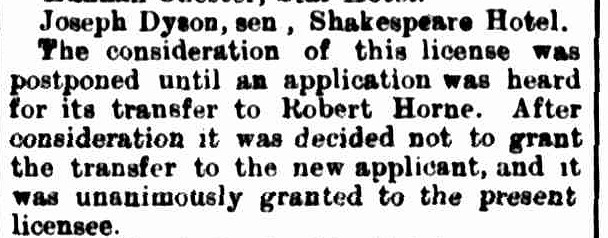
Launceston Examiner, 4 December 1888
A man named Nelson was arrested last night for locking up the landlord of the Shakespeare Hotel in his own bar and making off with the key.
The Mercury, 25 March 1889
Charles Nelson was charged with stealing a key, the property of Joseph Dyson, landlord of the Shakespeare Hotel. The case arose out of a stupid practical joke, and prisoner was discharged with a caution
Launceston Examiner, 26 March 1889
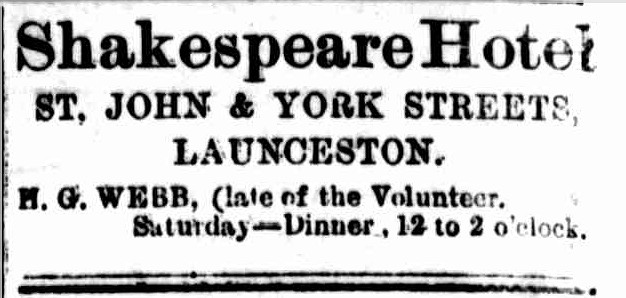
Deloraine-Westbury Advocate, 3 March 1894
Yesterday afternoon the Northern Tasmanian Licensed Victuallers’ Association entertained Mr Hugh G. Webb, of the Shakespeare Hotel, who is retiring from business and leaves shortly for the mainland. Mr T. Morton, president of the association, occupied the chair, and presented Mr Webb with an illuminated address. Several toasts were honored, and regret expressed at Mr and Mrs Webb’s departure from Launceston.
Daily Telegraph, 11 July 1903
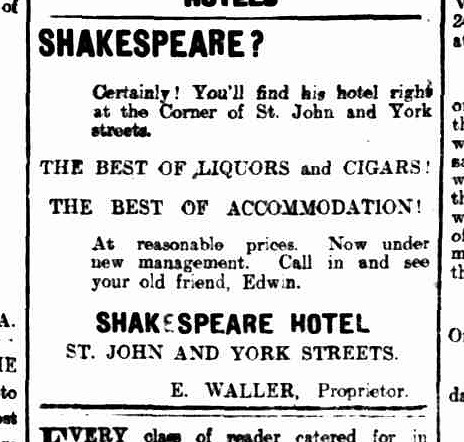
Daily Telegraph, 13 August 1904
Permission to Sell.-Mr. E. Waller, late of the Central and Clarendon Hotels, Zeehan and Evandale respectively, has been granted permission, to sell liquors at the Shakespeare Hotel under the license held by Mr. Hugh Houston until the next quarterly meeting of the Licensing Bench. This house will in future be known as the Metropolitan Hotel.
Examiner, 15 August 1904

Daily Telegraph, 17 August 1904